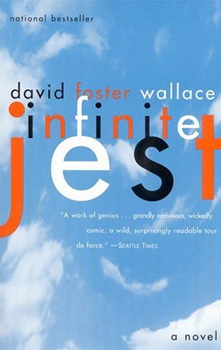
But what to do with it all? I once saw an interview with the author whence he noted the improbability that those who reviewed his book had read it. “Do the math,” he said, “there’s too many pages to read it all in that amount of time.” So true. It 0nly took me a decade of false starts and a few months of dedication. Nothing that would happen by an end-of-the-day-Friday sort of deadline.
With other books, I’ve made it a point to look Google-up the words and references I don’t know as I go, tightening my mind’s grasp on our language, to more firmly bear-hug and french-kiss this great English tongue of ours, in American. Well, that wasn’t really in the cards for this one. If there was ever a time to let oblique references and literary obfuscation wash over me like a dip under the Niagara, it was now.
So yeah, it’s big. And full of good stuff. Diamonds a-plenty. In plenty of rough. The shear quantity of rough parts I found troubling, though I suppose his editor did not.
On the up side, I really enjoyed the whole Salinger/Glass family thing. I happily latched on to Hal as an updated Holden Caulfield beset by East Coast prep-school privilege and brimming with potential, yet unsure of how to proceed with no real dreams and/or direction to point his way save the expectations of his uniquely gifted family. But I had nothing but head-scratching for the whole Quebecois Separatist subplot, though it was funny and the accent was outrageous. That being said, after a thousand pages, I was getting pretty curious as to how the whole ridiculous attack of the wheelchair-bound assassins was going to play out, to see what sort of mini-eschaton was about unfold on the courts of the Academy. To see how DFW was going to tie it all together. But then? Well… nothing.
Argh.
I’m not big on plot. My knee-jerk reaction to the best-novel-ever question is On The Road. But there were some pot-boiler, page-turner twists in there that ought to be going unambiguously Somewhere. Sure, you can cut up the book and re-string some scenes together in a more chronologically consistent order. You can make some educated guesses as to what lies behind the many veils of ambiguity. You can fill in the narrative gaps about the short-term fate of our wonderboy, Inc. But why-oh-why-oh-why does Mr. Wallace feel justified in cranking out dozen-page-long drug-mumbled rambles plucked right from the brains of addle-minded minor characters without giving us just a little proper satisfaction as to how the thing turns out? Yeah? Not saying I need to be spoon-fed Readi-Whip and Cheez-Whiz to be kept happy, but a wee bit of payoff would have been polite. Is it too much to ask? Dan Brown wouldn’t do this to me.
Despite this (point-missing, I know) grumble, INFJ is certainly a thing of beauty with much to ponder. Ponderous Exhibit #1 being addiction. Nary a character escaped the grip of some compulsion or another, chemical or otherwise. But mostly chemical.
Addiction, in INFJ, is the unspoken tie that binds every last man, woman and child in the near North American future. Your fix could be as simple as TV, or over-training for tennis, or as terrifying as multi-day blackouts at the mercy of an alphabet soup of grade-A pharmaceuticals. At the root, it’s not so different.
DFW delves deep into 12-step insight, including the concept of learning to separate Identifying and Comparing. The idea is that when listening to a fellow addict’s tale of woe, regardless of how horrible it may be — and DFW has a flair for the surreal and gratuitous grotesque, disturbingly — the important thing to remember is the common shared humanity between you and the speaker, to look at this fellow suffering human being as being like you, with the same feelings and fears, the same shames and weaknesses, and the same longings for escape. Don’t compare, don’t judge, don’t rank, just understand how they felt, how you’ve felt, how much we’ve all got in common.
Despite the hyperbole, there’s a lot of stop-and-look-in-the-mirror stuff in there. In other words, there’s plenty for any honest person to Identify with, as long as you can remember not to Compare.
So, now that I’ve read it? I’d like to read it all over again. I missed too much linguistic trickery the first time, and the words were too luxurious, too sweetly decadent, not to be enjoyed a second time. Eventually.
For instance, most of the story takes place in the fictitious just-outside-of-Boston town of Enfield, Massachusetts. However, there really was an Enfield, Massachusettes. It’s now at the bottom of a lake, washed-over and drowned-out in the name of progress, just like the book’s experialist territories formerly of USA. There’s a lot more where that came from. A lot more.
I must admit that I had pinned my hopes on a more transcendent experience through this journey of a thousand pages, to catch a view of some new Xanadu now that I’ve climbed to the top of this mighty pulp mountain. INFJ is too realistic for that. Like the character of Don Gately, on occasion we find moments of enlightenment, but most days we must struggle to do the redemptive work before us. As the adage says: “One day at a time.”
